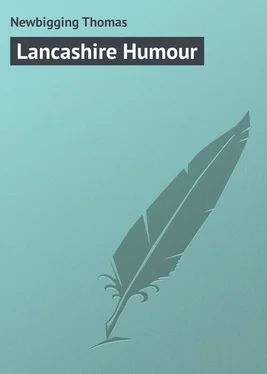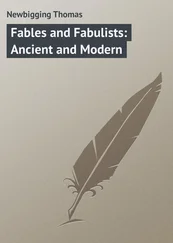It is well known that an admiration for dogs of a high quality, not less than for pigeons, is a weakness of the Lancashire collier, who will spend a small fortune to gratify his taste in this direction. A Tyldesley collier had a favourite bull-pup. This canine fancier with his dog and a friend were out for a ramble in the fields, and to make a short cut to get into the lane, his friend began scrambling through a hole in the hedge. The dog, unable, it may be presumed, to resist the sudden temptation, seized the calf of the disappearing leg with a grip which caused the owner of the said leg to shriek with pain. Despite his frantic wriggles and yells the brute held fast, and its master, appreciating the situation, clapped his hands in enthusiastic admiration, at the same time calling out to his beleaguered companion:
"Thole it, Bill! Thole it, mon! Thole it! It'll be th' makin' o' th' pup!"
Another such on returning home and finding that the day's milk had disappeared from the milk basin, angrily enquired what had become of it, and receiving for answer from his better-half that she had "gan it to th' childer for supper!" exclaimed: "Childer, be hang'd! thae should ha' gan it to th' bull pup!"
Some years ago there appeared in Punch sundry sketches of incidents in the mining districts. These may not all be true in the sense that the occurrences represented actually took place. But there is a spirit of truth in them, in that they illustrate a phase of the rudeness that often accompanies untutored tastes and undesirable habits.
The appearance of a stranger in the mining village, especially if he happens to wear a black cloth coat, is sometimes resented by the denizens of the place.
The new curate, a meek-looking individual, had arrived, and passing the corner of a street where a group of colliers had assembled, one of them asked:
"Bill, who's yon mon staring about him like a lost cat?"
"Nay, I doan't know," replied the other, "a stranger belike."
"Stranger, is he?" responded the first, "then hey've a hauve brick at 'im!"
The same, accosting one of his flock resting on a gate, and wishing to make himself agreeable, tried to open a conversation with the remark:
"A fine morning, my friend," was pulled up with the reply:
"Did aw say it war'nt? – dun yo' want to hargue?"
It is surprising how a person of regular habits feels the lack of any little comforts and companionships to which he has been accustomed. A Lancashire collier had lost a favourite dog by death, that, on Saturday afternoons or Sundays, he had been in the habit of taking with him for a stroll. An acquaintance sitting on a gate saw the bereaved collier coming along the road trundling a wheelbarrow.
"What's up wi' thee, Bob – what ar' t' doin' wi' th' wheelbarrow, and on good Sunday too?"
"Well, thae sees," replied Bob, "aw've lost mi dog, an' a fellow feels gradely lonesome bout company, so aw've brought mi wheelbarrow out for a bit of a ramble."
Конец ознакомительного фрагмента.
Текст предоставлен ООО «ЛитРес».
Прочитайте эту книгу целиком, купив полную легальную версию на ЛитРес.
Безопасно оплатить книгу можно банковской картой Visa, MasterCard, Maestro, со счета мобильного телефона, с платежного терминала, в салоне МТС или Связной, через PayPal, WebMoney, Яндекс.Деньги, QIWI Кошелек, бонусными картами или другим удобным Вам способом.
In their speech, their employments, their habits and general character, there is much in common between the natives of Lancashire and their neighbours of the West Riding.
Two Lectures on the Lancashire Dialect, by the Rev. W. Gaskell, M.A., Chapman & Hall, 193 Piccadilly, London, 1854, p. 13.












